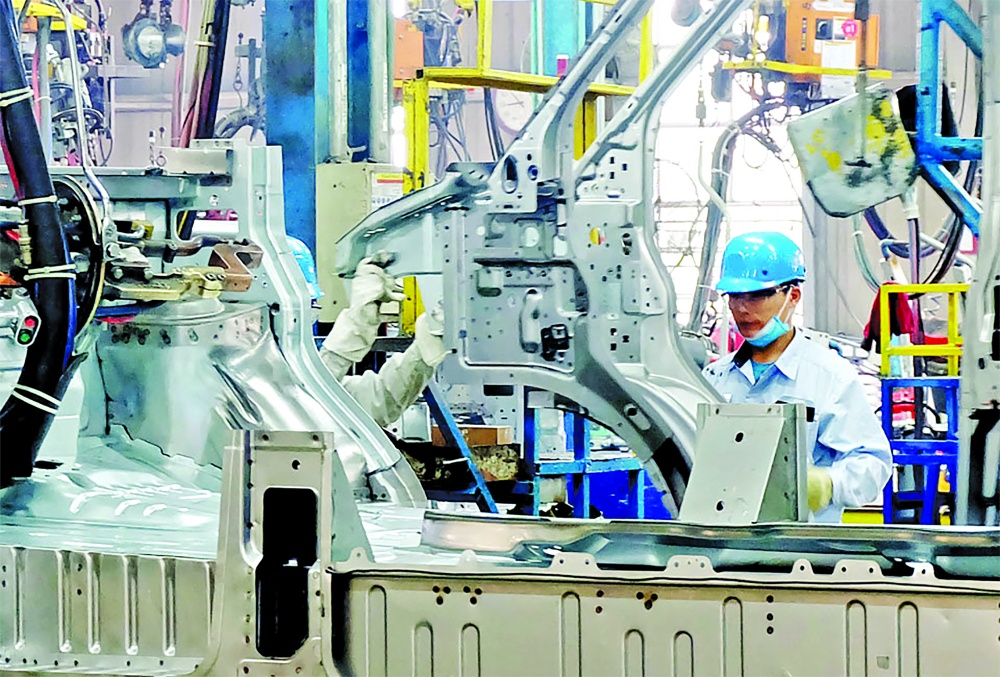Foreign investment in the first four months of this year reached an estimated US$6.28 billion, a five year high.

Việt Nam is gradually changing its economic growth model, shifting the structure towards creating high-added value. This means it needs to attract new generation investment and technology exchange in order to create sustainable development for domestic enterprises.
The race with many advantages
According to experts, Việt Nam is being welcomed as a new production link in Asia, playing an increasingly important role in the global smart manufacturing chain thanks in part to its natural resources.
Việt Nam is one of the few countries in the world to have vast rare earth reserves - an important raw material in semiconductor chip production. Those reserves are 22 million tonnes, ranking second only to China.
Thanks to this advantage several leading corporations in the semiconductor industry such as those from the US, Europe, China, Japan and South Korea plan to carry out a series of joint ventures and direct investment projects.
Nguyễn Anh Tuấn, Deputy Director of the Ministry of Planning and Investment's Foreign Investment Agency (FIA) told Haiquanonline.com.vn that many investors had selected Việt Nam as an investment destination for high-tech industries, including the semiconductor industry.
He said that this was an important starting point from which to realise the Government's strategic goal, making the semiconductor industry a leader in the drive to create growth.
Along with the potential of the semiconductor industry, many international experts and organisations have perceived that the country has emerged as a bright spot for foreign investment attraction.
According to HSBC's global research department, Việt Nam is among the three countries that excel in ASEAN in attracting foreign investment in the technology sector, along with Singapore and Malaysia.
Meanwhile, Lim Dyi Chang, head of commercial banking at UOB Vietnam said a remarkable investment shift was being seen in Việt Nam, away from industries using a large number of workers, into technology and service sectors. He saw Việt Nam as a production base for many high-tech products.
Identifying barriers
Experts forecast that foreign investors will continue to see Việt Nam as an attractive destination, considering it a strategic location for relocating their production bases. However, administrative procedures and heavy regulations remain the issues that foreign investors are most concerned about.
Many foreign businesses said they were keeping a close watch on upcoming regulatory changes that are likely to have a significant impact on their investments, such as the implementation of the National Electricity Development Plan for the 2021-30 period with a vision to 2050, a mechanism allowing the purchase of electricity directly and the implementation and impact of the Land Law 2024.
According to Joseph Uddo, chairman of the American Chamber of Commerce, the most important factor for a favourable investment climate is a fair, transparent, predictable and streamlined regulatory environment that values innovation - not only to attract new interest, but also to maintain and grow existing investment.
During the annual Việt Nam Business Forum (VBF) held in March in Hà Nội, the chairman recommended that all the new laws and regulations be reviewed and restricted to new administrative procedures.
He also highlighted the need for consistent, affordable, reliable and sustainable electricity, adding that investors need more streamlined regulations in order to install and provide access to renewable energy in Việt Nam.
Denzel Eades, deputy chairman of the British Chamber of Commerce in Việt Nam said at the VBF that stronger administrative reforms were still needed to better serve business.
Foreign investment inflows into Việt Nam in the first four months of this year saw a yearly increase of 4.5 per cent to nearly US$9.27 billion, according to figures from the FIA.
A total of 966 new foreign-invested projects were licensed during this period, with a combined registered capital of over $7.11 billion, representing increases of 29 per cent and 73 per cent, respectively. Additionally, 345 operating projects were permitted to raise their capital by over $1.23 billion, down 26 per cent year-on-year.
Meanwhile, foreign investors allocated over $929.6 million to contributing capital to and purchasing shares of domestic companies via 902 transactions, a decline of 70 per cent compared to the same period last year.
The report also indicates that foreign investment disbursement in the reviewed period reached an estimated US$6.28 billion, marking a record high over the past five years.
The manufacturing and processing sector attracted the largest share of foreign investment, $5 billion, accounting for 70.2 per cent of the total. Real estate followed with nearly $1.6 billion (22.5 per cent), while other sectors accounted for the remaining $519.6 million (7.3 per cent).
Among the 50 countries and territories investing in Việt Nam, Singapore led with over $2.59 billion, representing 36.4 per cent of the total, followed by Hong Kong with nearly $898.6 million (12.6 per cent), mainland China ($740.2 million or 10.4 per cent), Turkey ($730 million or 10.3 per cent) and Taiwan ($512.3 million or 7.2 per cent). — VNS






